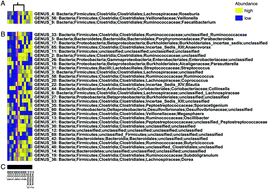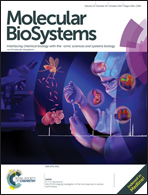Dissection of the module network implementation “LemonTree”: enhancements towards applications in metagenomics and translation in autoimmune maladies†
Abstract
Under the current deluge of omics, module networks distinctively emerge as methods capable of not only identifying inherently coherent groups (modules), thus reducing dimensionality, but also hypothesizing cause–effect relationships between modules and their regulators. Module networks were first designed in the transcriptomic era and further exploited in the multi-omic context to assess (for example) miRNA regulation of gene expression. Despite a number of available implementations, expansion of module networks to other omics is constrained by a limited characterization of the solutions' (modules plus regulators) accuracy and stability – an immediate need for the better characterization of molecular biology complexity in silico. We hence carefully assessed for LemonTree – a popular and open source module network implementation – the dependency of the software performances (sensitivity, specificity, false discovery rate, solutions' stability) on the input parameters and on the data quality (sample size, expression noise) based on synthetic and real data. In the process, we uncovered and fixed an issue in the code for the regulator assignment procedure. We concluded this evaluation with a table of recommended parameter settings. Finally, we applied these recommended settings to gut-intestinal metagenomic data from rheumatoid arthritis patients, to characterize the evolution of the gut-intestinal microbiome under different pharmaceutical regimens (methotrexate and prednisone) and we inferred innovative clinical recommendations with therapeutic potential, based on the computed module network.



 Please wait while we load your content...
Please wait while we load your content...